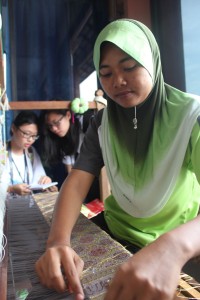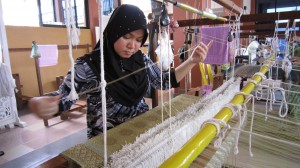NINE years ago, Shahidah Mazlam had intended to become a policewoman after sitting for her Sijil Pelajaran Malaysia (SPM). Unfortunately, she faced objection from her family over her choice of career.
“My mother didn’t want to see me work in the tough line of duty and I had no choice but to listen to her,” said Shahidah, 26.
Feeling dejected, it was by chance that Shahidah found a new passion in life. She had attended a songket weaving workshop organised by Yayasan Tuanku Nur Zahirah (YTNZ) in Kuala Terengganu, Terengganu and that’s where she fell in love with the art.
Now, instead of pursuing a rough and tough career in the armed forces, Shahidah and her sister Salriana spend their days weaving songket at YTNZ.
“My sister and I grew up watching our mother weave, so it was easy for us to pick up the skill,” said Salriana, 22.
These sisters are just some of the eager youngsters who learn to make and produce songket at YTNZ.
Established in 2007, YTNZ is a cultural and heritage foundation under the royal patronage of Sultanah Terengganu Tuanku Nur Zahirah which hopes to stimulate the growth of the songket industry in the nation.
Songket is hand-woven in silk or cotton, and is intricately patterned with gold or silver threads which stand out against the background cloth and create a shimmering effect.
This is considered a luxury material and is often used during formal ceremonies as sarong or headgears.
Songket can also be made into bags and other outfits, and can fetch up to thousands of ringgit.
The songket created by the YTNZ weavers are sold in Bangsar, KL under the Royal Terengganu Songket brand.
“Many people want to buy songket, but there are not enough people to make it. They don’t think of this as a sustainable job,” said YTNZ personnel Tengku Noruzawati Tengku Jaafar, 27.
YTNZ intends to change that by creating opportunities and giving out financial aid to rural weavers.
“We must do our best to help people. When we make a profit, we must do our best to give it back to society. It is a give and take process,” she said.
Many of the weavers at YTNZ are from rural areas. The foundation provides them access to a conducive workplace and proper weaving equipment. Plus, they are also given fixed monthly incomes, pensions and insurance benefits.
“We support those in financial need by offering them a short course in songket weaving.
“However, it’s up to them whether to take the job or not. We allow them to work from home because we know how important it is for them to take care of their family,” said Noruzawati.
Nurul Hidayati Ibrahim has six siblings and came to work at YTNZ three years ago to help make ends meet for her family.
“I had no knowledge about songket weaving when I first came in YTNZ. I slowly picked up the necessary skills as I worked and have much more knowledge about weaving now,” said Nurul, 24.
Songket weaving is a long process and requires one to be very careful and patient.
The yarn has to be separated into threads for weaving. The threads are then pulled to the desired length and tied around a piece of wood.
Different coloured threads are then carefully arranged to obtain the desired patterns. The weaving process is the one that requires the most effort.
“If you want to weave, you cannot be rough,” said Salriana, who is very gentle when it comes to weaving as the threads used are delicate.
One of the frustrations weavers face is when the thread breaks, as the process of replacing the broken thread is time consuming. There is additional stress on the weavers during festive seasons as they have to rush to meet tight deadlines.
The weavers also suffer from back pains due to the long hours they spend sitting on the floor or at the looms.
“It is challenging, but it’s all worthwhile.” said Salriana.
One of the other challenges a weaver often faces is coming up with creative designs. Norita Abbas a songket designer at YTNZ said that she always tries to accommodate the taste of people today.
“We have to keep up with the current time as well as hold on to our traditions,” said Norita, 30.
However, she makes an exception when it comes to designing songket.
Despite living in a modern world, Norita prefers designing her songket by hand rather than on the computer which she claims “lacks emotion”.
“Computers are fast, but I feel more connected to my designs when doing it by hand.”
The Universiti Malaysia Sarawak (UNIMAS) graduate joined YTNZ four years ago, and shared that it wasn’t easy when she started working there.
“Weaving is no easy task,” said Norita. “Some girls leave this place after a few days. They simply can’t take pressure.”
Norita has designed hundreds of songket patterns for YTNZ and enjoys her job there.
She loves designing songket and hopes that more people will share her passion for it.
“This art was handed to us by our ancestors and it is our duty to preserve it. I really hope that more young people would help to keep this tradition alive in the future,” she said.



Tell us what you think!